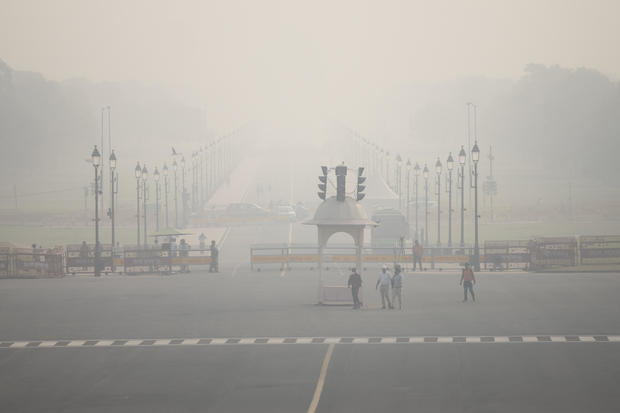
Air pollution in India’s capital forces schools to close as an annual blanket of smog returns to choke Delhi
New Delhi — Schools in the Indian capital have been ordered to close and vehicle use will be restricted from next week in a bid to curb toxic air pollution that has left Delhi blanketed in a thick layer of smog.
The local government in the Delhi capital region has ordered all primary schools to remain shuttered or hold classes online until November 10. The administration also said it would keep half of all vehicles off the region’s roads between Nov. 13 and 20 by imposing the “odd-even” rule, which allows vehicles with license plates ending in odd numbers on the road on odd numbered dates and vehicles with even numbers on even dates.
Pollution levels are expected to rise even further after the Hindu Diwali religious festival on Nov. 12, when fireworks are typically set off in huge volumes despite a ban aimed at mitigating the impact of the smoky celebrations.
Authorities have also ordered a ban on construction work in the city along with restrictions on entry of trucks and heavy vehicles.
IQAir.
Earlier this week, the concentration of dangerous PM 2.5 particles — very fine pollutants which are easily inhaled and can settle deep in the lungs — was nearly 80 times the World Health Organization’s safe limit, making breathing for the city of 20 million people a struggle.
“It really feels like living in a gas chamber,” Delhi resident Manish Kumar told CBS News. “I am so scared of going out to run errands or take my kids out for a sport.”
An air quality index (AQI) reading of 300 or above is deemed “hazardous” on the international rating system, while at “severe” levels, air pollution “affects healthy people and seriously impacts those with existing diseases.”
On Tuesday, one of the air quality monitors in Delhi recorded an AQI of 588.
A 2022 study by the U.S. research group Energy Policy Institute (EPIC) at the University of Chicago said air pollution in major South Asian cities had shortened the life expectancy of inhabitants by up to 10 years.
What’s poisoning Delhi’s air?
Delhi’s air pollution goes off the charts every winter as farmers burn off the remains of their harvested crops in neighboring states, sending acrid smoke drifting over the capital region which is trapped at ground level by the cooler air temperatures.
Despite a ban by the country’s Supreme Court, many farmers in Punjab, Haryana, and Himachal Pradesh states continue to set their crop stubble on fire to prepare the land for replanting.
The government has faced criticism for failing to give farmers viable and large-scale alternatives to burning to remove their crop waste.
On Tuesday, India’s Supreme Court ordered the three states around Delhi to put a stop to the farm fires.
“We want it stopped. We don’t know how you do it, it’s your job. But it must be stopped. Something has to be done immediately,” the court said.
“While farm fires and festivities are often the trigger for high air pollution in Delhi during October-November, year-round polluting sources, of power plants, industries, traffic and construction have to be managed to find any meaningful results,” Aarti Khosla, Director of the India-based climate research and consulting agency Climate Trends, told CBS News.
Source: cbsnews.com